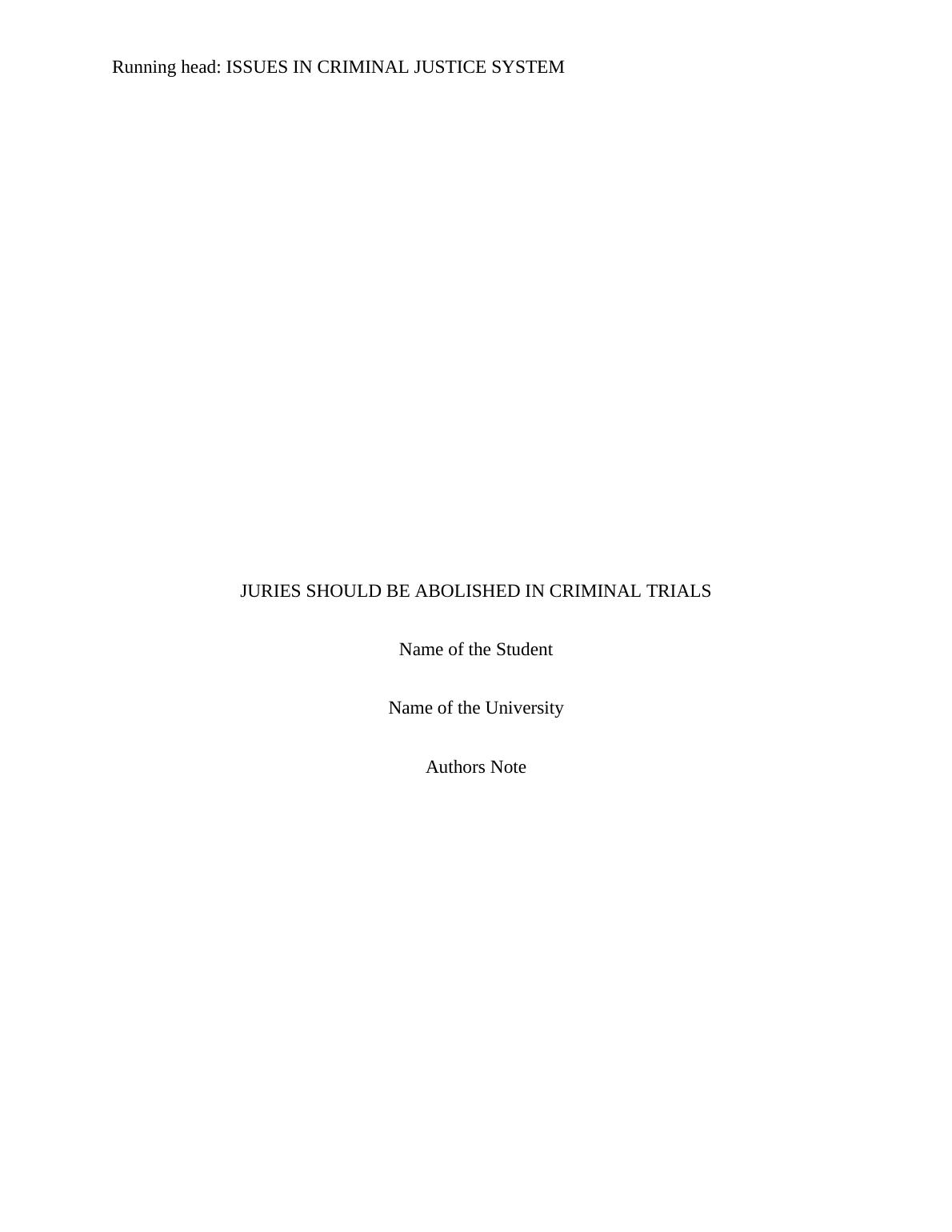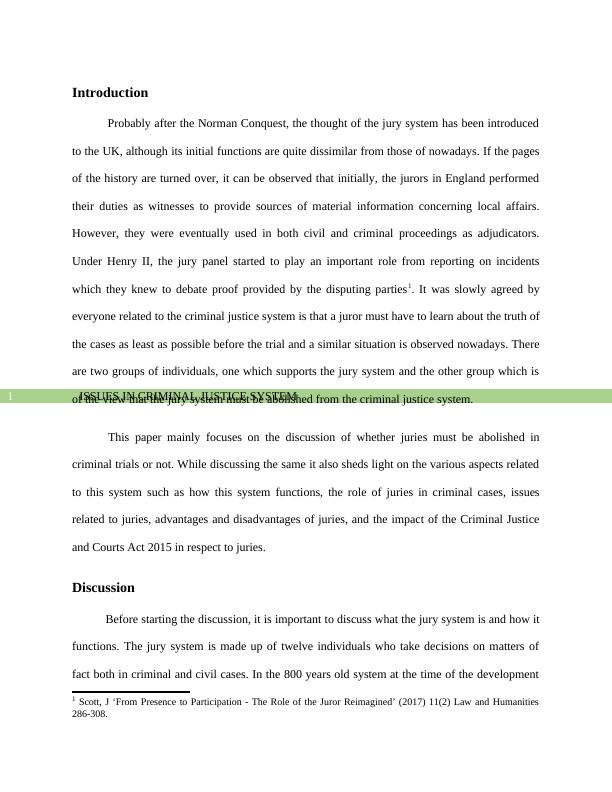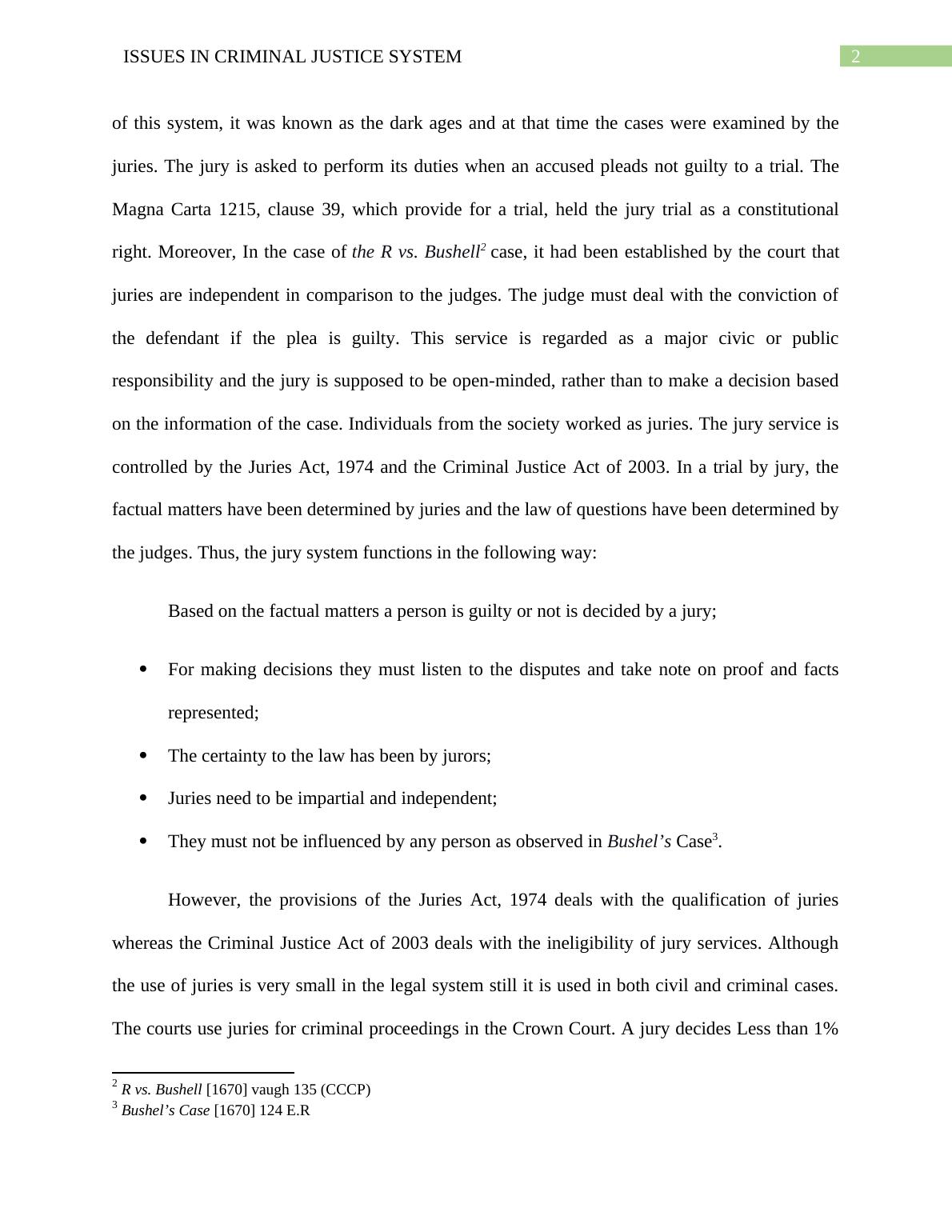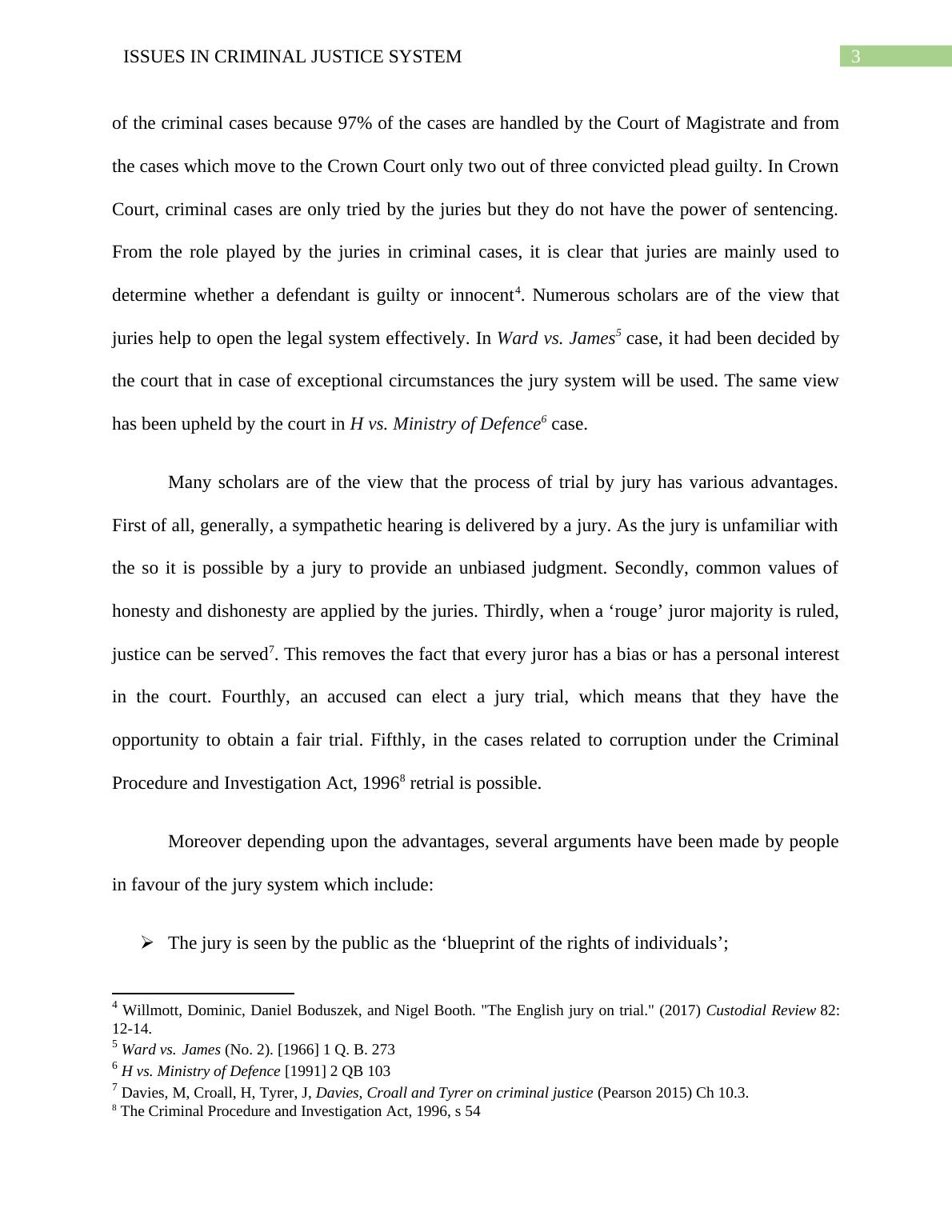Issues in Criminal Justice System | Report
Added on 2022-08-26
11 Pages2709 Words23 Views
Running head: ISSUES IN CRIMINAL JUSTICE SYSTEM
JURIES SHOULD BE ABOLISHED IN CRIMINAL TRIALS
Name of the Student
Name of the University
Authors Note
JURIES SHOULD BE ABOLISHED IN CRIMINAL TRIALS
Name of the Student
Name of the University
Authors Note

ISSUES IN CRIMINAL JUSTICE SYSTEM1
Introduction
Probably after the Norman Conquest, the thought of the jury system has been introduced
to the UK, although its initial functions are quite dissimilar from those of nowadays. If the pages
of the history are turned over, it can be observed that initially, the jurors in England performed
their duties as witnesses to provide sources of material information concerning local affairs.
However, they were eventually used in both civil and criminal proceedings as adjudicators.
Under Henry II, the jury panel started to play an important role from reporting on incidents
which they knew to debate proof provided by the disputing parties1. It was slowly agreed by
everyone related to the criminal justice system is that a juror must have to learn about the truth of
the cases as least as possible before the trial and a similar situation is observed nowadays. There
are two groups of individuals, one which supports the jury system and the other group which is
of the view that the jury system must be abolished from the criminal justice system.
This paper mainly focuses on the discussion of whether juries must be abolished in
criminal trials or not. While discussing the same it also sheds light on the various aspects related
to this system such as how this system functions, the role of juries in criminal cases, issues
related to juries, advantages and disadvantages of juries, and the impact of the Criminal Justice
and Courts Act 2015 in respect to juries.
Discussion
Before starting the discussion, it is important to discuss what the jury system is and how it
functions. The jury system is made up of twelve individuals who take decisions on matters of
fact both in criminal and civil cases. In the 800 years old system at the time of the development
1 Scott, J ‘From Presence to Participation - The Role of the Juror Reimagined’ (2017) 11(2) Law and Humanities
286-308.
Introduction
Probably after the Norman Conquest, the thought of the jury system has been introduced
to the UK, although its initial functions are quite dissimilar from those of nowadays. If the pages
of the history are turned over, it can be observed that initially, the jurors in England performed
their duties as witnesses to provide sources of material information concerning local affairs.
However, they were eventually used in both civil and criminal proceedings as adjudicators.
Under Henry II, the jury panel started to play an important role from reporting on incidents
which they knew to debate proof provided by the disputing parties1. It was slowly agreed by
everyone related to the criminal justice system is that a juror must have to learn about the truth of
the cases as least as possible before the trial and a similar situation is observed nowadays. There
are two groups of individuals, one which supports the jury system and the other group which is
of the view that the jury system must be abolished from the criminal justice system.
This paper mainly focuses on the discussion of whether juries must be abolished in
criminal trials or not. While discussing the same it also sheds light on the various aspects related
to this system such as how this system functions, the role of juries in criminal cases, issues
related to juries, advantages and disadvantages of juries, and the impact of the Criminal Justice
and Courts Act 2015 in respect to juries.
Discussion
Before starting the discussion, it is important to discuss what the jury system is and how it
functions. The jury system is made up of twelve individuals who take decisions on matters of
fact both in criminal and civil cases. In the 800 years old system at the time of the development
1 Scott, J ‘From Presence to Participation - The Role of the Juror Reimagined’ (2017) 11(2) Law and Humanities
286-308.

ISSUES IN CRIMINAL JUSTICE SYSTEM2
of this system, it was known as the dark ages and at that time the cases were examined by the
juries. The jury is asked to perform its duties when an accused pleads not guilty to a trial. The
Magna Carta 1215, clause 39, which provide for a trial, held the jury trial as a constitutional
right. Moreover, In the case of the R vs. Bushell2 case, it had been established by the court that
juries are independent in comparison to the judges. The judge must deal with the conviction of
the defendant if the plea is guilty. This service is regarded as a major civic or public
responsibility and the jury is supposed to be open-minded, rather than to make a decision based
on the information of the case. Individuals from the society worked as juries. The jury service is
controlled by the Juries Act, 1974 and the Criminal Justice Act of 2003. In a trial by jury, the
factual matters have been determined by juries and the law of questions have been determined by
the judges. Thus, the jury system functions in the following way:
Based on the factual matters a person is guilty or not is decided by a jury;
For making decisions they must listen to the disputes and take note on proof and facts
represented;
The certainty to the law has been by jurors;
Juries need to be impartial and independent;
They must not be influenced by any person as observed in Bushel’s Case3.
However, the provisions of the Juries Act, 1974 deals with the qualification of juries
whereas the Criminal Justice Act of 2003 deals with the ineligibility of jury services. Although
the use of juries is very small in the legal system still it is used in both civil and criminal cases.
The courts use juries for criminal proceedings in the Crown Court. A jury decides Less than 1%
2 R vs. Bushell [1670] vaugh 135 (CCCP)
3 Bushel’s Case [1670] 124 E.R
of this system, it was known as the dark ages and at that time the cases were examined by the
juries. The jury is asked to perform its duties when an accused pleads not guilty to a trial. The
Magna Carta 1215, clause 39, which provide for a trial, held the jury trial as a constitutional
right. Moreover, In the case of the R vs. Bushell2 case, it had been established by the court that
juries are independent in comparison to the judges. The judge must deal with the conviction of
the defendant if the plea is guilty. This service is regarded as a major civic or public
responsibility and the jury is supposed to be open-minded, rather than to make a decision based
on the information of the case. Individuals from the society worked as juries. The jury service is
controlled by the Juries Act, 1974 and the Criminal Justice Act of 2003. In a trial by jury, the
factual matters have been determined by juries and the law of questions have been determined by
the judges. Thus, the jury system functions in the following way:
Based on the factual matters a person is guilty or not is decided by a jury;
For making decisions they must listen to the disputes and take note on proof and facts
represented;
The certainty to the law has been by jurors;
Juries need to be impartial and independent;
They must not be influenced by any person as observed in Bushel’s Case3.
However, the provisions of the Juries Act, 1974 deals with the qualification of juries
whereas the Criminal Justice Act of 2003 deals with the ineligibility of jury services. Although
the use of juries is very small in the legal system still it is used in both civil and criminal cases.
The courts use juries for criminal proceedings in the Crown Court. A jury decides Less than 1%
2 R vs. Bushell [1670] vaugh 135 (CCCP)
3 Bushel’s Case [1670] 124 E.R

ISSUES IN CRIMINAL JUSTICE SYSTEM3
of the criminal cases because 97% of the cases are handled by the Court of Magistrate and from
the cases which move to the Crown Court only two out of three convicted plead guilty. In Crown
Court, criminal cases are only tried by the juries but they do not have the power of sentencing.
From the role played by the juries in criminal cases, it is clear that juries are mainly used to
determine whether a defendant is guilty or innocent4. Numerous scholars are of the view that
juries help to open the legal system effectively. In Ward vs. James5 case, it had been decided by
the court that in case of exceptional circumstances the jury system will be used. The same view
has been upheld by the court in H vs. Ministry of Defence6 case.
Many scholars are of the view that the process of trial by jury has various advantages.
First of all, generally, a sympathetic hearing is delivered by a jury. As the jury is unfamiliar with
the so it is possible by a jury to provide an unbiased judgment. Secondly, common values of
honesty and dishonesty are applied by the juries. Thirdly, when a ‘rouge’ juror majority is ruled,
justice can be served7. This removes the fact that every juror has a bias or has a personal interest
in the court. Fourthly, an accused can elect a jury trial, which means that they have the
opportunity to obtain a fair trial. Fifthly, in the cases related to corruption under the Criminal
Procedure and Investigation Act, 19968 retrial is possible.
Moreover depending upon the advantages, several arguments have been made by people
in favour of the jury system which include:
The jury is seen by the public as the ‘blueprint of the rights of individuals’;
4 Willmott, Dominic, Daniel Boduszek, and Nigel Booth. "The English jury on trial." (2017) Custodial Review 82:
12-14.
5 Ward vs. James (No. 2). [1966] 1 Q. B. 273
6 H vs. Ministry of Defence [1991] 2 QB 103
7 Davies, M, Croall, H, Tyrer, J, Davies, Croall and Tyrer on criminal justice (Pearson 2015) Ch 10.3.
8 The Criminal Procedure and Investigation Act, 1996, s 54
of the criminal cases because 97% of the cases are handled by the Court of Magistrate and from
the cases which move to the Crown Court only two out of three convicted plead guilty. In Crown
Court, criminal cases are only tried by the juries but they do not have the power of sentencing.
From the role played by the juries in criminal cases, it is clear that juries are mainly used to
determine whether a defendant is guilty or innocent4. Numerous scholars are of the view that
juries help to open the legal system effectively. In Ward vs. James5 case, it had been decided by
the court that in case of exceptional circumstances the jury system will be used. The same view
has been upheld by the court in H vs. Ministry of Defence6 case.
Many scholars are of the view that the process of trial by jury has various advantages.
First of all, generally, a sympathetic hearing is delivered by a jury. As the jury is unfamiliar with
the so it is possible by a jury to provide an unbiased judgment. Secondly, common values of
honesty and dishonesty are applied by the juries. Thirdly, when a ‘rouge’ juror majority is ruled,
justice can be served7. This removes the fact that every juror has a bias or has a personal interest
in the court. Fourthly, an accused can elect a jury trial, which means that they have the
opportunity to obtain a fair trial. Fifthly, in the cases related to corruption under the Criminal
Procedure and Investigation Act, 19968 retrial is possible.
Moreover depending upon the advantages, several arguments have been made by people
in favour of the jury system which include:
The jury is seen by the public as the ‘blueprint of the rights of individuals’;
4 Willmott, Dominic, Daniel Boduszek, and Nigel Booth. "The English jury on trial." (2017) Custodial Review 82:
12-14.
5 Ward vs. James (No. 2). [1966] 1 Q. B. 273
6 H vs. Ministry of Defence [1991] 2 QB 103
7 Davies, M, Croall, H, Tyrer, J, Davies, Croall and Tyrer on criminal justice (Pearson 2015) Ch 10.3.
8 The Criminal Procedure and Investigation Act, 1996, s 54

End of preview
Want to access all the pages? Upload your documents or become a member.
Related Documents
History Criminal Law And Trials Assignmentlg...
|8
|1821
|11
Essay on Criminal Court Assignmentlg...
|7
|2244
|343
Law and Social Justice Assesment Reportlg...
|7
|1569
|12
Trial by Jury in Criminologylg...
|7
|1585
|335
Legal Method and Systemslg...
|6
|1804
|40
Stages of a Criminal Trial in American Criminal Justice Systemlg...
|4
|714
|193
